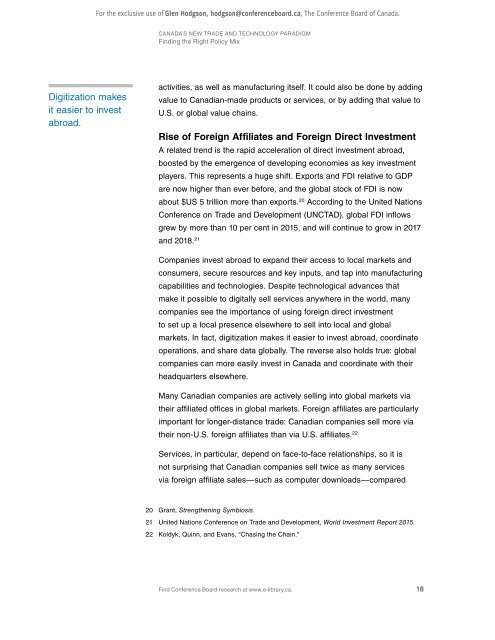Paradigm
8088-canadasnewtrade-en_rpt
8088-canadasnewtrade-en_rpt
You also want an ePaper? Increase the reach of your titles
YUMPU automatically turns print PDFs into web optimized ePapers that Google loves.
For the exclusive use of Glen Hodgson, hodgson@conferenceboard.ca, The Conference Board of Canada.<br />
Canada’s New Trade and Technology <strong>Paradigm</strong><br />
Finding the Right Policy Mix<br />
Digitization makes<br />
it easier to invest<br />
abroad.<br />
activities, as well as manufacturing itself. It could also be done by adding<br />
value to Canadian-made products or services, or by adding that value to<br />
U.S. or global value chains.<br />
Rise of Foreign Affiliates and Foreign Direct Investment<br />
A related trend is the rapid acceleration of direct investment abroad,<br />
boosted by the emergence of developing economies as key investment<br />
players. This represents a huge shift. Exports and FDI relative to GDP<br />
are now higher than ever before, and the global stock of FDI is now<br />
about $US 5 trillion more than exports. 20 According to the United Nations<br />
Conference on Trade and Development (UNCTAD), global FDI inflows<br />
grew by more than 10 per cent in 2015, and will continue to grow in 2017<br />
and 2018. 21<br />
Companies invest abroad to expand their access to local markets and<br />
consumers, secure resources and key inputs, and tap into manufacturing<br />
capabilities and technologies. Despite technological advances that<br />
make it possible to digitally sell services anywhere in the world, many<br />
companies see the importance of using foreign direct investment<br />
to set up a local presence elsewhere to sell into local and global<br />
markets. In fact, digitization makes it easier to invest abroad, coordinate<br />
operations, and share data globally. The reverse also holds true: global<br />
companies can more easily invest in Canada and coordinate with their<br />
headquarters elsewhere.<br />
Many Canadian companies are actively selling into global markets via<br />
their affiliated offices in global markets. Foreign affiliates are particularly<br />
important for longer-distance trade: Canadian companies sell more via<br />
their non-U.S. foreign affiliates than via U.S. affiliates. 22<br />
Services, in particular, depend on face-to-face relationships, so it is<br />
not surprising that Canadian companies sell twice as many services<br />
via foreign affiliate sales—such as computer downloads—compared<br />
20 Grant, Strengthening Symbiosis.<br />
21 United Nations Conference on Trade and Development, World Investment Report 2015.<br />
22 Koldyk, Quinn, and Evans, “Chasing the Chain.”<br />
Find Conference Board research at www.e-library.ca.<br />
18


